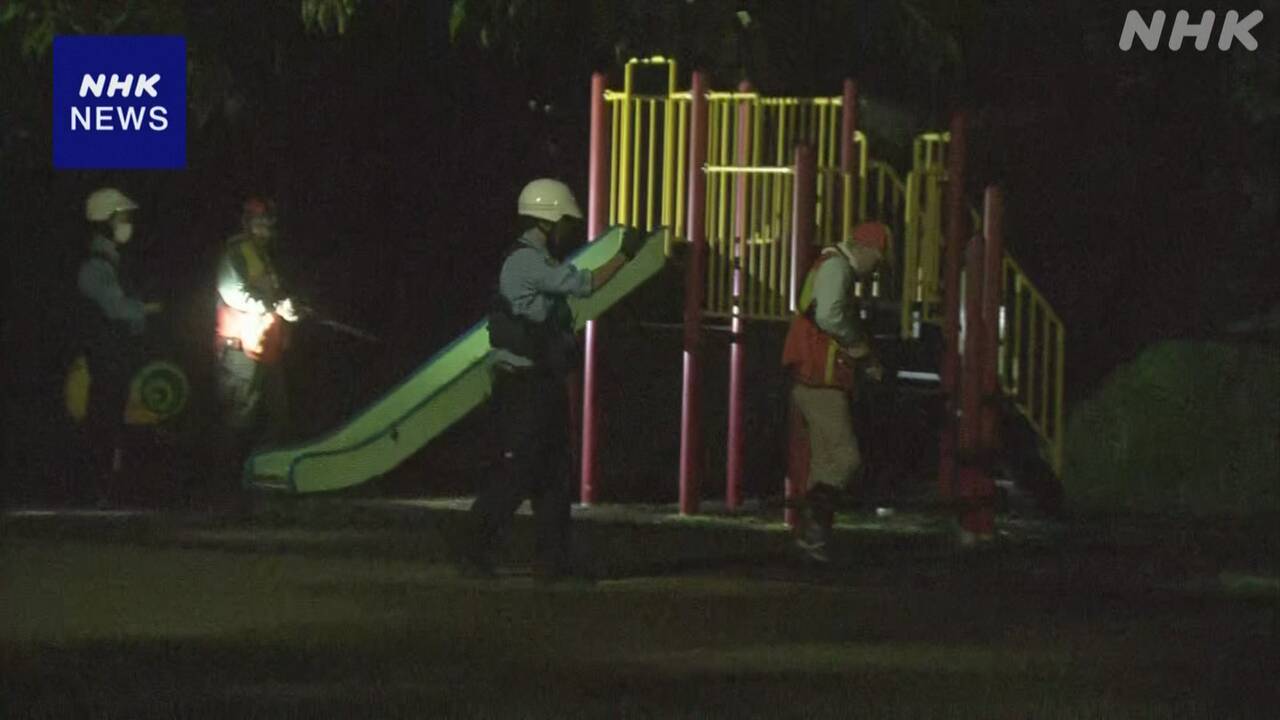Published: 2025-09-27 00:23
札幌 公園散歩中の男性がヒグマに襲われけが 命に別状なし

26日夜、札幌市西区の公園で散歩をしていた40代の男性がヒグマに襲われました。警察によりますと、男性は右腕にけがをしましたが、命に別状はないということです。
警察によりますと、26日午後8時ごろ、札幌市西区の平和丘陵公園で散歩をしていた40代の男性から「クマに襲われた」などと消防に通報がありました。
男性は近くの住民に助けを求め、右腕にけがをして病院に搬送されましたが、命に別状はないということです。
男性は犬の散歩中に2頭のヒグマが公園にいたと消防に話していて、およそ1時間後には公園から西に400メートルほど離れた路上で山の中に入っていく体長およそ1メートルのヒグマが目撃されたということで、警察や市が警戒を強化しています。
ヒグマによる被害を受けて、北海道は札幌市西区に「ヒグマ警報」を出して夜間や早朝の外出を控えるとともに、ヒグマを引きつけるゴミや農作物の管理を徹底するよう呼びかけています。
| # | 言葉 | 意味 |
|---|---|---|
| 3 | 札幌市西区 | さっぽろしにしく (札幌市西区) : Sapporoshinishiku (place) |
| 2 | 襲う | おそう (襲う) : 1. to attack; to assail; to make an assault; to strike; to hunt down 2. to succeed (someone in a post, role, etc.) |
| 2 | 右腕 | みぎうで (右腕) : 1. right arm 2. right-hand man; right hand; right-hand person |
| 2 | 命 | いのち (命) : 1. life; life force 2. lifetime; lifespan |
| 2 | 別状 | べつじょう (別状) : something unusual; something wrong; mishap; accident; serious condition (e.g. after an injury); different situation |
| 2 | 消防 | しょうぼう (消防) : 1. fire fighting 2. fire department; fire brigade |
| 2 | およそ | およそ (凡そ) : 1. about; roughly; approximately 2. generally; on the whole; as a rule |
| 1 | 平和 | へいわ (平和) : peace; harmony |
| 1 | 丘陵 | きゅうりょう (丘陵) : hill |
| 1 | 通報 | つうほう (通報) : 1. report; notification; tip; bulletin 2. message (in information and communication theory) |
| 1 | 住民 | じゅうみん (住民) : inhabitant; resident; citizen; population |
| 1 | 助け | たすけ (助け) : assistance; help; aid; support; reinforcement |
| 1 | 求める | もとめる (求める) : 1. to want; to wish for 2. to request; to demand; to require; to ask for |
| 1 | 搬送 | はんそう (搬送) : 1. transportation; conveyance; delivery 2. hospitalization; transfer to hospital |
| 1 | 話す | はなす (話す) : 1. to talk; to speak; to converse; to chat 2. to tell; to explain; to narrate; to mention; to describe; to discuss |
| 1 | 離れる | はなれる (離れる) : 1. to be separated; to be apart; to be distant 2. to leave; to go away |
| 1 | 路上 | ろじょう (路上) : 1. on the road; on the street; in the street 2. on the way |
| 1 | 入る | いる (入る) : to get in; to go in; to come in; to flow into; to set; to set in |
| 1 | 体長 | たいちょう (体長) : length (of an animal); body length |
| 1 | 目撃 | もくげき (目撃) : witnessing; observing; sighting |
| 1 | 警戒 | けいかい (警戒) : vigilance; caution; alertness; precaution; being on guard |
| 1 | 強化 | きょうか (強化) : strengthening; intensifying; reinforcement; enhancement; solidification |
| 1 | 被害 | ひがい (被害) : (suffering) damage; injury; harm |
| 1 | 受ける | うける (受ける) : 1. to receive; to get 2. to catch (e.g. a ball) |
| 1 | 北海道 | ほっかいどう (北海道) : Hokkaido (island, prefectural-level administrative unit) |
| 1 | 警報 | けいほう (警報) : alarm; warning |
| 1 | 夜間 | やかん (夜間) : night; nighttime |
| 1 | 早朝 | そうちょう (早朝) : early morning |
| 1 | 外出 | がいしゅつ (外出) : going out; outing; leaving (one's home, office, etc.) |
| 1 | 控える | ひかえる (控える) : 1. to be temperate in; to refrain; to abstain; to hold back; to restrain oneself from excessive ... 2. to make notes; to jot down (e.g. phone number) |
| 1 | とも | とも (供) : companion; follower; attendant; retinue |
| 1 | 引きつける | ひきつける (引きつける) : 1. to attract; to draw near 2. to charm; to attract; to fascinate; to entice |
| 1 | 農作物 | のうさくぶつ (農作物) : crops; agricultural produce |
| 1 | 管理 | かんり (管理) : control; management (e.g. of a business) |
| 1 | 徹底 | てってい (徹底) : 1. thoroughness; completeness; consistency 2. thorough enforcement; seeing to it that a policy, etc. is carried out without exception |
| 1 | 呼びかける | よびかける (呼びかける) : 1. to call out to; to hail; to address 2. to appeal |